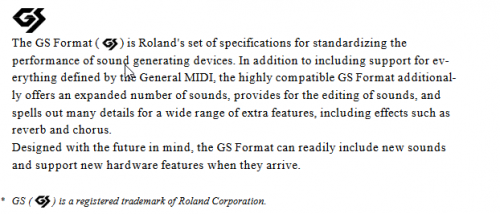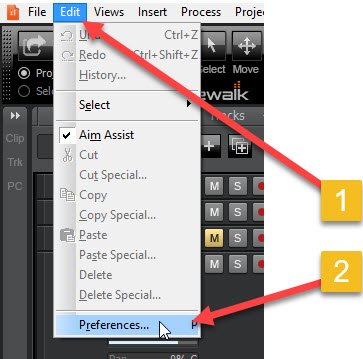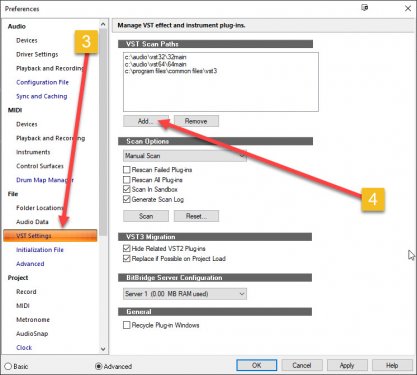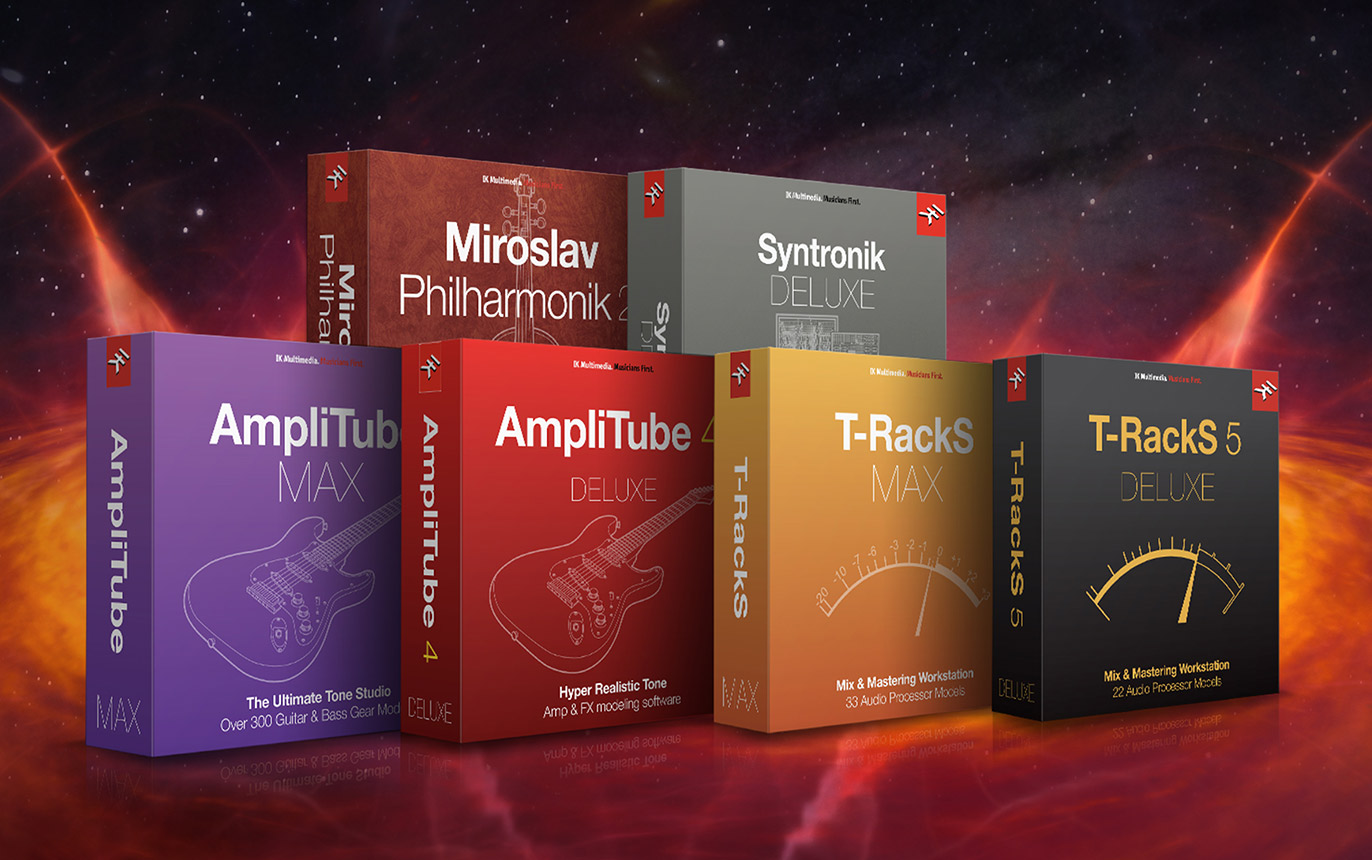-
Posts
3,637 -
Joined
-
Last visited
-
Days Won
16
Posts posted by TheSteven
-
-
8 minutes ago, msmcleod said:
Isn't General MIDI 2 nearly 20 years old now? I think the spec came out in 1999.
Yes, 1999
8 minutes ago, msmcleod said:MIDI 2.0 is a different beast, and looks pretty cool.
I especially like the MIDI CI part, where controllers can actually tell your DAW what their capabilities are.
I'm excited about it, just hope it doesn't take another 20 years to finally get it approved.
-
 1
1
-
-
6 hours ago, John said:
Right General MIDI 2 is the full name. My view is it seems we are only interested in GM in relation with a DAW. I am not talking about patches but how we use MIDI. Nor did I see anything in the documents that says anything about how it will impact a DAW. To me most softsynths have their own way of using MIDI. They don't follow the GM spec.
I also have a Rolond 5080. I really like that box.
>we are only interested in GM in relation with a DAW.
In looking at the info it seams like a primary concern is not screwing up the existing MIDI implementation. So hopefully all our current or old stuff (DAWS, other software, equipment) will still work flawlessly.
The new abilities could be very nice, for example MIDI controllers that work with any DAW or sound module with virtually no preconfiguration.-
 1
1
-
-
I believe that accessing patches in GM1 and GM2 is the same, just that GM2 has more standard patches - 256 vs 128.
Both use the MSB (Most Significant Bit) and LSB (Least Significant Bit) system you described.
If you have a GM1 device and feed it GM2 data it will respond to the messages it recognizes.
GM2 CC# messages may be ignored or be handled differently.
The additional GM2 instruments fall under the same instrument families found in GM1 so you'll still get a piano or drum kit, just possibly not the same kind. For example GM2 has 9 different drum kits vs the 1 found in GM1.The GM2 spec standardized handling of control messages for a variety of parameters, for example:
- Filter Resonance (Timbre/Harmonic Intensity) (cc#71)
- Release Time (cc#72)
- Attack time (cc#73)
- Brightness/Cutoff Frequency (cc#74)
- Decay Time (cc#75)
- Vibrato Rate (cc#76)
- Vibrato Depth (cc#77)
- Vibrato Delay (cc#78)
Not saying the GM1 devices didn't have the ability to control these kind of settings through MIDI just that the handling (CC#) wasn't consistent across manufacturers.
Quoteby 1999 many manufacturers were producing sound generators (synthesizers) with far more sounds and more expression capability, so they developed extensions to General MIDI 1 which increased both the number of available sounds and the amount of control available for sound editing and musical performance. All GM 2 devices are also fully compatible with General MIDI 1.
More information at:
https://www.midi.org/specifications-old/item/general-midi-2
https://en.wikipedia.org/wiki/General_MIDI
https://en.wikipedia.org/wiki/General_MIDI_Level_2-
 1
1
-
Run the Spitfire installer to obtain latest updates.
- the Spitfire Audio installer v3.0.35 - minor improvements and bug fixes. Posted Jan 9th.
- Free update - Orchestral Swarm v1.0.1b25 - posted Jan 4th, changes - not listed.
There maybe other updates - I found out Swarm was updated when I checked my account for something else...
-
 1
1
-
MAGIC JAW HARPS for Kontakt
list price: €29,-
INTRO: €12 only!!- 7 Jaw Harps (3x regular, 2x handmade, 2x Dan Moi)
- 8 Kontakt instruments
- 1 main instrument and 4 sound presets
- 1 set with all jaw harps, 1 percussive set
- 1 unique ‘Automatic Jaw Harp’ instrument
- 519 samples (mono WAV, 24bit, 48kHz)
- 5 custom IR reverbs
- Tempo-synced rhythms and rolls
- Superb realism with up to 5 velocity layers and up to 7 Round-robins
- Gorgeous sound recorded with a Neumann U47 fet
- Total size uncompressed: 188MB
- full Kontakt 5.3+ required!!!
- list price: €29,- (+VAT for EU customers)
-
Maybe they just left off the word 'General' on the case?
I've always liked the SC 8850, but never owned one.Wikipedia Roland SC-8850
"The SC-8850 was the first sound module to incorporate the new General MIDI Level 2 standard."
From the SC-8850 manual: http://cdn.roland.com/assets/media/pdf/SC-8850_OM.pdfQuoteSupports General MIDI 1/General MIDI 2/GS Format
This unit is a sound module compatible with the General MIDI 1 and 2. It can be used
to play back any song data (General MIDI scores) bearing the General MIDI logo.
This unit is also compatible with the Roland GS format. It can be used to play back
any song data bearing the GS logo.
GS appears to be proprietary Roland format:

-
 1
1
-
-
MIDI 2 not GM2.
You're talking about General MIDI 2 which is an instrument mapping/handling spec.
https://www.midi.org/specifications-old/item/general-midi-2
Nothing should change about the workings of your Sound Canvas; Your device will be detected and handled as a MIDI v1. GM2 will remain as is.
-
 1
1
-
-
Just before the full eclipse the clouds blew in and completely covered the moon

hoping things will clear at some point before it's over
-
 1
1
-
-
More tidbits...
The following info and a lot more at:
https://www.midi.org/articles-old/midi-manufacturers-association-mma-adopts-midi-capability-inquiry-midi-ci-specificationMIDI Manufacturers Association (MMA) Adopts MIDI Capability Inquiry (MIDI-CI) Specification.
The MIDI-CI specification is now available for download by MIDI Association members. .
MIDI has been a successful tool for more than 3 decades. The features of MIDI 1.0 continue to work well.
The basic semantic language of music does not change and as a result the existing definitions of MIDI as musical control messages continue to work remarkably well.
However, MIDI has not changed to fully take advantage of the new technical environment around it. We want to expand the feature set of MIDI capabilities.
At the same time, we recognize there are several key hurdles and requirements to consider as we make any additions to MIDI:
•Backwards compatibility is a key requirement. Our users expect new MIDI devices to work seamlessly with MIDI devices sold over the past 33 years.
•All MIDI Status Bytes are defined. The opcodes and data payloads are defined. It is difficult to define any new message types or change the format of the existing MIDI messages.
Expanding MIDI with new features requires a new protocol with extended MIDI messages. To protect backwards compatibility in an environment with expanded features, devices need to confirm the capabilities of other connected devices. When 2 devices are connected to each other, they use MIDI 1.0 and confirm each other's capabilities before using expanded features. If both devices share support for the same expanded MIDI features they can agree to use those expanded MIDI features. MIDI-CI provides this mechanism.
MIDI-CI: Solution for Expanding MIDI while Protecting Backwards Compatibility:
MIDI Capability Inquiry (MIDI-CI) is a mechanism to allow us to expand MIDI with new features while protecting backward compatibility with MIDI devices that do not understand these newly defined features.
MIDI-CI separates older MIDI products from newer products with new capabilities and provides a mechanism for two MIDI devices to understand what new capabilities are supported.
MIDI-CI assumes and requires bidirectional communication. Once a MIDI-CI connection is established between devices, query and response messages define what capabilities each device has.
MIDI-CI then negotiates or auto-configures to use those features that are common between the devices. MIDI-CI provides test mechanisms when enabling new features. If a test fails, then devices fall back to using MIDI 1.0 for that feature. MIDI-CI improves MIDI capabilities in several key areas.
MIDI-CI allows devices to use an expanded MIDI protocol with high resolution and multiple per note controllers. It allows for incremental adoption of new MIDI features by providing a fallback to MIDI 1.0 devices in all cases.
MIDI-CI Includes Queries for 3 major areas of expanded MIDI functionality:
1. Protocol Negotiation
2. Profile Configuration
3. Property Exchange
-
 1
1
-
 1
1
-
-
Saw this, maybe it'll work for you...
-
Free MIDI effects plugins from Plugin Guru
Information and download links:Show MIDI

Show MIDI is a MIDI Plug-In that shows you what you play on your keyboard controller with a visual display on your computer. This is helpful for people teaching classes, hosting webinars or livestreams or making videos where they need a keyboard to display what they are performing so others can watch along. I use this to make my YouTube videos because of the added flexibility of showing up to 4 MIDI CC#’s as well as Pitch Bend.
Your DAW HAS to support MIDI Effects in order for this plug-in to be useful to you.
Available for PC’s in 32-bit and 64-bit VST and VST3 formats.
Available for Macintosh in Audio Unit, VST and VST3 format.This a FREE MIDI Plug-In that displays MIDI Activity with a keyboard and up to 5 faders that can be set to any of MIDI’s 127 MIDI CC#’s. The PlugIn is ReSizable and able to be set to display between 25 and 88 notes (5 different keyboard size options). This is FREE but you need to be a registered user here to add it to your account and download it.
If you enjoy this plug-in and want to say thank you, then please buy a library of patches (or two or three). That is the nicest way to say thank you and you get new sounds for your favorite software plugins to be inspired by at the same time. So thank you in advance for your support.
ModMate
ModMate is a very powerful but simple plug-in that allows you to display on the Left set of faders, incoming MIDI activity from Pitch Bend and 4 assignable MIDI CC lanes. The 4 faders on the Right are 4 different assignable MIDI CC# sliders that can be assigned to DIFFERENT MIDI CC#’s if desired (or aftertouch). The 4 boxes in each input fader strip allow you to determine which of the 4 MIDI CC output lanes that input MIDI data will “Take over”. The cool thing with this is that you can assign CC1 (Mod Wheel) to control all 4 lanes by checking the boxes for all 4 lanes in the cc1 strip. We are starting to use more than 1 MIDI CC to control the sounds in our libraries. So these new Omnisphere 2.5 libraries (Airwave V3 and Beautifully Broken) can be used and all 4 MIDI CC’s can be changed using just the pitch bend up/down and Modulation wheel, for example.
Also, since these settings can be saved in most DAW’s as a preset, you can make different MIDI CC templates for different sample libraries or for different ways you might use this plugin. So your Spitfire libraries can have one preset that assigns your hardware to control their libraries, while a different preset sets everything up for controlling your Omnisphere libraries.
NOTE: This MIDI Effect PlugIn only will work in DAW’s that support MIDI effect PlugIns. Also, if you use this and then send a song file to someone else, they also MUST have ModMate installed in their system as well. This is doing real-time conversion of MIDI data. It is not writing this data into your sequence files, it is just re-channeling it in real-time to from one MIDI CC# to another.
Available in PC (VST and VST3 32-bit and 64-bit formats) and Mac (Audio Unit, VST and VST3)
-
 1
1
-
 1
1
-
-
If you use hardware with your DAW this plugin can come in handy!
https://non-lethal-applications.com/products/snapshotWhat is Snapshot?
Snapshot is a simple idea, take a picture of anything you are using in your recording session and store it in the tracks of your DAW.
- Got a sound on your vintage 1176 compressor you've set for the vocal? Snapshot it.
- Got a guitar amp setting you just love? Snapshot it.
- Want to recall the mic set-up on your cabs or drum kit? Snapshot it.
Snap it on your phone, send it to your computer and save it in your session using the free Snapshot plug-in. You can also add notes to each instance of Snapshot. It's like a chinagraph for the 21st century.
Snapshot works with all major DAWs, uses minimal resources and is simple to use ... and did we say it's free?
Download Snapshot for Pro Tools, Logic Pro X, Cubase, Studio One, in fact, any DAW that supports AAX, AU or VST plug-in formats.
New features in version 2
- Snapshot now supports Windows 10 as well as macOS 10.9 and above
- Load several images into Snapshot and move through them easily
- Snapshot now displays each image in a set in their original aspect ratio
- Rotate each image within Snapshot
-
 1
1
-
Just a heads up that sale is suppose to end Saturday.
-
and now (wasn't earlier) there's a Cakewalk update!!!
Edit: but maybe that's what Larry intended to say in his 2nd post...
Release Notes (2019.01)
Features & Enhancements
- In addition to exporting Cakewalk projects to BandLab, you can now also export projects from your BandLab library and open them in Cakewalk
- Ripple Edit indicator in the Track view
- Export Module now displays H:M:S:F, and the Selection mode persists if there is no selection
- Start Screen can now show up to 500 project templates (previously limited to 100)
- BandLab Assistant can be launched from the Utilities menu
- Integrated zplane élastique Pro audio stretching and pitch shifting has been updated to version 3.3 with bug fixes and performance enhancements
- Cakewalk Plug-in Manager optimizations
- Plug-in Browser text colors can be edited in Cakewalk Theme Editor; VST2 and VST3 plug-ins use different colors
- Option to view release notes after installation is complete
- New user forums (discuss.cakewalk.com) now accessible from the Help menu
Bug Fixes
- Recording on muted Take lanes was possible
- Missing folders could reassign user paths to the AppData path automatically
- Switching plug-in categories in the Cakewalk Plug-in Manager could be very slow
-
I'm looking forward to MIDI 2.0 but TBH with the way I work (and not doing anything live at the moment) I don't expect it to make much difference in my work.
Wonder how long it will take various DAWs, MIDI instruments and plugins to comply with MIDI 2.0 once/if it becomes a standard?
A lot of hardware companies will love this because it will give them a chance to resell you the v2 version of your audio interface or controller.
By the same measure a lot of software companies will be upset because they'll have to shoehorn v2 features into their product(s) at some point within their annual update cycle to appear competitive. -
The following product update is now available for download:
* Voxengo Voxformer 2.12
This update includes the following changes:
* Added "anti-aliasing" spectrum display mode.
* 27% lower CPU usage on AVX2-capable processors (in 64-bit mode).
* Added Retina support on macOS, and automatic high-resolution UI size adjustment on Windows.
To download this update, or change the notification settings, please visit the Voxengo web page at http://www.voxengo.com/cp/updates/ -
50% off all FXpansion BFD Expansions and Groove Packs, including the new Wooden Snares expansion till Feb 18th
at https://www.fxpansion.com/news/jan-2019-bfd-pack-sale/Cheaper at JRR Shop
https://www.kvraudio.com/forum/viewtopic.php?p=7287891#p7287891JRR Shop
FXpansion BFD 8-Bit Kit Library $62.50
FXpansion BFD Black Album Drums Library $62.50
FXpansion BFD Cocktail Library $24.50
Fxpansion BFD Crush Expansion Pack $49.50
FXPansion BFD Dan Foord Polyrhythmic Metal $19.50
FXpansion BFD Decatom Library $24.50
FXpansion BFD Deluxe Collection Library $74.50
FXpansion BFD Dunnett Ti Library $34.50
FXpansion BFD Eldorado Library $74.50
FXpansion BFD Grooves for Taiko $12.50
FXpansion BFD Heavy Expansion $34.50
FXpansion BFD Heavy Rock Classics Grooves $19.50
FXpansion BFD Horsepower Americana-style Drum Library $74.50
FXpansion BFD Imperial Drums Library $62.50
FXpansion BFD Japanese Taiko Percussion Library $62.50
FXpansion BFD Jazz & Funk Library $74.50
FXpansion BFD Jazz Maple Expansion $34.50
FXpansion BFD JEX Library $24.50
FXpansion BFD JM Essentials Vol. 1 $19.50
FXpansion BFD JM Essentials Vol. 2 $19.50
FXpansion BFD Kabuki & Noh Percussion Library $74.50
FXpansion BFD London Sessions $74.50
FXpansion BFD Maple Custom Absolute Library $24.50
FXpansion BFD Marching Drums Library $34.50
FXpansion BFD Metal Snares Expansion Library $34.50
FXpansion BFD Modern Drummer Snare Selects $49.50
FXpansion BFD Modern Retro Library $62.50
FXPansion BFD Modern Rock Grooves $19.50
FXpansion BFD Oak Custom Library $24.50
FXpansion BFD Oblivion Library $49.50
FXpansion BFD Orchestral Library $34.50
FXpansion BFD Percussion Library $74.50
FXpansion BFD Sabian Digital Vault $62.50
FXpansion BFD Signature Snares Vol.1 $34.50
FXpansion BFD Signature Snares Vol.2 $34.50
FXpansion BFD Sleishman Library $24.50
FXpansion BFD Sleishman Snares Library $24.50
FXpansion BFD Sphere Library $34.50
FXpansion BFD Stanton Moore Cymbals $34.50
FXPansion BFD Stanton Moore Grooves $19.50
FXpansion BFD Swan Percussion Library $24.50
Fxpansion BFD Vintage Recording Techniques $49.50
FXPansion BFD Vintage Rock Grooves $19.50
FXpansion BFD Virtually Erskine $34.50
FXpansion BFD Virtually Erskine Grooves $19.50
Fxpansion BFD Wooden Snares Expansion Pack $35
FXpansion BFD XFL Library $74.50
FXpansion BFD Zildjian Digital Vault Vol. 1 $74.50
FXpansion BFD Zildjian Digital Vault Vol.2: Orchestral Field Cymbal Expansion Pack $74.50 -
?
If you're talking about the OP, I suspect TtF has the Expansions in question. -
Lol. OK, now I feel better!
-
Thanks, I thought I had looked thoroughly...
Shame that per Steinberg:
QuoteIt is not possible to update to Groove Agent 5 from Groove Agent SE (included in Cubase and Nuendo).
-
On 1/15/2019 at 11:31 PM, Ben Schütte said:
Well, I ran Native Access, that didn't help.
I then tried installing all NI plugins on my C drive (which i really wanted to avoid because it's not a large drive) and badaboom badabing, 30 new plugins found

Turns out xfer plugins were recognized because they were on C without me knowing (I told them to install on E but they installed on C anyway :s ).
It's really unfortunate that you can A) only install Bandlab on C and B) bandlab only recognizes plugins on C.If a dev is reading this, please help owners of small C drives like me and let us install somewhere else

TL;DR:
Install your plugins on C and you're good> bandlab only recognizes plugins on C.
No so, like almost every DAW out there you have to set the path where it scans to find your VST plugins.
With Cakewalk you do this by

Regarding > you can A) only install Bandlab on C
If you had gone into Advanced install options when you installed the CbB you could have chosen the install location. -
Looks like these also work with Groove Agent SE that comes with Cubase.
Been trying to find out difference between Groove Agent & Groove Agent SE.
Looks like only difference is SE version is bundled with Cubase and lacks upgrade options. Is this correct? -
Depends on what you mean by simple or easy management .
Once you start collecting a number of plugins or working with more that one DAW it can be more of a headache.
Storing your plugins in a system folder complicates installing updates, backups and in some cases authorizations.This is the system that I currently use.
It optimizes scanning, eliminates almost all dupes and it works across multiple DAWS.C:.
├───Audio
│ ├───VST32
│ │ ├───32Main
│ │ └───Has 64 bit version
│ └───VST64
│ ├───64Main
│ └───Has VST3 versionFor Cakewalk my scan path is:
C:\Audio\VST32\32Main;
C:\Audio\VST64\64Main
C:\Program Files\Common Files\VST3For other DAWS just select the appropriate paths.
-
 2
2
-
-
https://www.ikmultimedia.com/news/index.php?id=nammslam2019
There will probably be additional mark downs showing up shortly at your favorite reseller.
https://www.audiodeluxe.com/taxonomy/term/240/?f[0]=bm_field_on_sale_now%3Atrue



Coming Soon - Dronar Orchestral Woodwinds
in Deals
Posted
Thanks Larry!
Looks interesting.
A lot of similarity with Spitfire's Orchestral Swarm - not as deep but it's 1/5th the price (during the current sale).